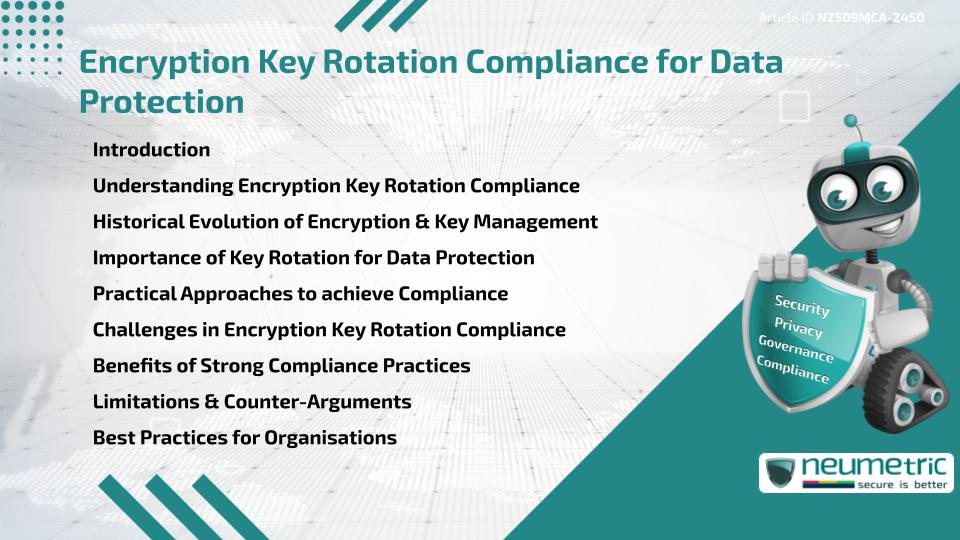Table of Contents
ToggleIntroduction
Encryption Key Rotation Compliance refers to the process of regularly changing Cryptographic Keys in line with Regulatory Standards & Security Best Practices. It ensures that encrypted data remains protected against unauthorised access, even if an old key is compromised. By maintaining strong Compliance, organisations can reduce Risks, safeguard Sensitive Information & demonstrate Accountability.
This article explores the meaning, history, benefits, challenges & Best Practices of Encryption Key Rotation Compliance. It explains why Compliance is central to Data Protection strategies in both regulated industries & everyday Business Operations.
Understanding Encryption Key Rotation Compliance
At its core, Encryption Key Rotation Compliance ensures that keys are not reused indefinitely. Instead, they are retired & replaced at intervals defined by Policies, regulations or Risk Assessments. This limits the window of opportunity for attackers to exploit stolen or exposed keys.
A helpful analogy is changing the locks on a house. If a spare key is lost, changing the locks ensures continued security. Similarly, rotating Encryption Keys prevents unauthorised parties from accessing Sensitive Data.
Historical Evolution of Encryption & Key Management
Encryption has been used for centuries, from ancient ciphers to modern digital algorithms. In early computing, static keys were often reused for long periods, creating Vulnerabilities.
With the rise of large-scale cyberattacks in the late twentieth century, organisations & governments recognised the need for systematic key management. Standards such as ISO 27001 & NIST guidelines formalised the requirement for periodic key rotation. Today, Encryption Key Rotation Compliance is an essential part of modern Cybersecurity frameworks.
Importance of Key Rotation for Data Protection
Encryption keys protect Sensitive Data such as Financial transactions, Healthcare records & Personal Information. Without proper rotation:
- Compromised keys can provide attackers long-term access.
- Outdated keys may weaken security as algorithms evolve.
- Compliance violations can lead to penalties & reputational harm.
By enforcing Encryption Key Rotation Compliance, organisations strengthen the confidentiality & integrity of their data, while meeting legal & industry-specific obligations.
Practical Approaches to achieve Compliance
Organisations can adopt several practical methods to achieve Compliance:
- Automated Key Management Systems: Tools that enforce regular rotation & logging.
- Policy Enforcement: Clearly documented Policies specifying key rotation intervals.
- Auditing & Monitoring: Regular checks to ensure Compliance with internal & external standards.
- Access Controls: Restricting who can generate, distribute or retire Encryption Keys.
- Integration with Cloud Services: Leveraging built-in Compliance features from Cloud Providers.
Challenges in Encryption Key Rotation Compliance
Despite its necessity, organisations face hurdles in implementing Encryption Key Rotation Compliance. These include:
- Technical complexity in integrating rotation across diverse systems.
- Downtime Risks if rotations are not carefully managed.
- Limited expertise in Cryptographic key management.
- Costs associated with specialised tools & skilled personnel.
These challenges can discourage organisations from adopting consistent rotation practices, despite the Risks of non-Compliance.
Benefits of Strong Compliance Practices
When Encryption Key Rotation Compliance is properly implemented, the benefits are significant:
- Enhanced Security: Reduced Likelihood of Breaches from compromised keys.
- Regulatory Protection: Avoidance of penalties for non-Compliance.
- Customer Trust: Increased confidence among Clients & Stakeholders.
- Operational Integrity: Stronger resilience against cyberattacks.
Limitations & Counter-Arguments
Some critics argue that frequent key rotation may create unnecessary complexity without significantly improving security in certain contexts. Others point out that poor implementation can disrupt services & increase costs.
These perspectives highlight the need for balanced Policies that match Risk levels with Compliance obligations, avoiding both over-rotation & under-rotation.
Best Practices for Organisations
To achieve effective Encryption Key Rotation Compliance, organisations should:
- Follow international standards such as NIST guidelines.
- Automate key rotation wherever possible.
- Document & communicate clear rotation Policies.
- Train Employees on secure key handling practices.
- Conduct regular Audits & Risk Assessments.
Takeaways
- Encryption Key Rotation Compliance strengthens Data Protection.
- Regular key changes reduce Risks of compromised security.
- Challenges exist but can be mitigated with automation & training.
- Compliance ensures both Regulatory alignment & Customer Trust.
- Balanced Policies avoid unnecessary complexity & disruptions.
FAQ
Why is key rotation important for Data Protection?
It limits the damage caused by compromised keys & ensures continued Confidentiality & Integrity of Sensitive Data.
How often should encryption keys be rotated?
The frequency depends on regulations, Industry Standards & organisational Policies, often ranging from monthly to annually.
What challenges do organisations face with Compliance?
Challenges include technical complexity, potential downtime, high costs & lack of skilled expertise.
Does Compliance guarantee complete security?
No, Compliance reduces Risks but does not eliminate all Threats. Other Security Measures must complement key rotation.
Can Small Businesses achieve Encryption Key Rotation Compliance?
Yes, by using automated tools & cloud services that offer built-in key management & Compliance features.
How does automation help in key rotation Compliance?
Automation reduces errors, enforces regular intervals & simplifies Compliance with Audit-ready records.
Need help for Security, Privacy, Governance & VAPT?
Neumetric provides organisations the necessary help to achieve their Cybersecurity, Compliance, Governance, Privacy, Certifications & Pentesting needs.
Organisations & Businesses, specifically those which provide SaaS & AI Solutions in the Fintech, BFSI & other regulated sectors, usually need a Cybersecurity Partner for meeting & maintaining the ongoing Security & Privacy needs & requirements of their Enterprise Clients & Privacy conscious Customers.
SOC 2, ISO 27001, ISO 42001, NIST, HIPAA, HECVAT, EU GDPR are some of the Frameworks that are served by Fusion – a SaaS, multimodular, multitenant, centralised, automated, Cybersecurity & Compliance Management system.
Neumetric also provides Expert Services for technical security which covers VAPT for Web Applications, APIs, iOS & Android Mobile Apps, Security Testing for AWS & other Cloud Environments & Cloud Infrastructure & other similar scopes.
Reach out to us by Email or filling out the Contact Form…


